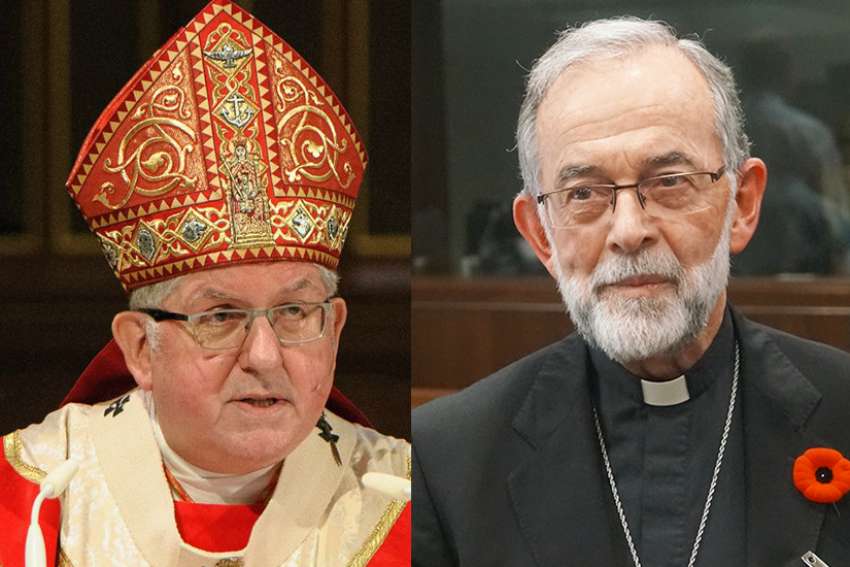Cardinal Collins testified via video conferencing on Oct. 30, along with the president of the CCCB Bishop Lionel Gendron of Saint-Jean-Longueuil and Bill Simpson, a criminal lawyer, who attended the session in Ottawa.
Photo by Deborah Gyapong
Justice Committee to keep protections for clergy and religious service
By Deborah Gyapong, Canadian Catholic News
OTTAWA – After an “avalanche” of letters and testimony from faith leaders, the Justice Committee has amended Bill C-51 to keep protections for religious leaders and worship services.
The committee amended the omnibus bill Nov. 8, the day after the Canadian Conference of Catholic Bishops (CCCB) released an open letter to the Justice Minister dated Oct. 31 from more than 60 religious leaders and groups urging the government to keep the Section 176 that protects religious leaders from being assaulted or obstructed in their work, and protects religious services from being disrupted.
“I was persuaded by the testimony of people who came before us, including His Eminence Cardinal Collins,” said Liberal MP Anthony Housefather, chair of the Justice Committee, said in an interview. Cardinal Collins testified via video conferencing on Oct. 30, along with the president of the CCCB Bishop Lionel Gendron of Saint-Jean-Longueuil and Bill Simpson, a criminal lawyer, who attended the session in Ottawa.
“There was no value to deleting the section,” Housefather said, noting that even though it had seldom used and “theoretically it could have been covered” by other sections in the Criminal Code, this section “let people of faith know they were recognized in a special way in the Criminal Code.”
Housefather said he will return the amended Bill C-51 to the House of Commons Nov 20 at report stage of third reading.
“I’m very, very hopeful the government will support this amendment,” Housefather said.
"We are extremely pleased that the Standing Committee has recommended to Parliament that protection of religious services remain in the Criminal Code,” said Neil McCarthy, a spokesman for Cardinal Collins. “The advocacy efforts of many diverse faith communities played a critical role and reminds us that we need to continue to be engaged in these important issues. Certainly from a Catholic perspective, we will continue to do so."
Housefather said the committee heard not only from witnesses but from constituents who wrote letters, emails and made phone calls. “I do appreciate all who did reach out to MPs. It’s only when you reach out that people know what you are thinking.”
Housefather said all three parties agreed to keep Section 176, though there was some disagreement on how to update the words “clergyman or minister.” The bill now refers to “officials of religious and spiritual services” to better include Indigenous spirituality and other non-Christian forms of worship and makes the language gender-neutral.
NDP MP Alistair MacGregor told the committee he had not noticed the deletion of Section 176 until he received a “trickle” of correspondence that evolved “into an absolute avalanche.”
“I think at first I was prepared to accept the government's argument that the offences in this part of the Criminal Code can most certainly be covered in other sections, but I think I've been absolutely convinced that it needs to be kept in the Criminal Code, simply because it has very significant symbolic value for the people involved,” he said.
Religious groups reacted with jubilation after the Justice Committee amended the bill.
"It's a great day for religious freedom in Canada,” said ARPA Canada’s director of law and policy André Schutten in a release. “Today, the Justice Committee recognized that religious worship services are special gatherings deserving special protection.”
“University lectures, public speeches or protests in parks can have hecklers or protesters from time to time, but worship services are different in kind from other gatherings,” he said. “They need, and today kept, special protection."
Schutten co-signed the interfaith letter also signed by the CCCB, along with Jewish, Sikh, Buddhist, Orthodox and Muslim leaders.
“In a genuinely pluralistic society, citizens must be free to meet, worship, and collectively express themselves without fear of being silenced by reprisal or intimidation,” said the Christian Legal Fellowship’s executive director and legal counsel Derek Ross, who welcomed the decision. “Canada’s historical reality regarding the oppression of religious and other minority groups – some of which has been effectively prosecuted under section 176 – must not be forgotten.”
“The retention of section 176 in the Criminal Code demonstrates Canada’s ongoing societal commitment to protect the fundamental freedoms of religious expression and association.”
“Canadians of all faiths stepped forward to defend their rights to worship in safety,” said Conservative MP David Anderson, the Tories’ religious freedom critic in a release. “We did not understand why the Liberals were so determined to interfere with religious freedom when the number of attacks and incidents involving faith communities are increasing. These protections are still being used in court.”
“Thank you for your calls, e-mails and advocacy on this issue,” he said. “Today marks a victory for religious communities in Canada.”
Please support The Catholic Register
Unlike many media companies, The Catholic Register has never charged readers for access to the news and information on our website. We want to keep our award-winning journalism as widely available as possible. But we need your help.
For more than 125 years, The Register has been a trusted source of faith-based journalism. By making even a small donation you help ensure our future as an important voice in the Catholic Church. If you support the mission of Catholic journalism, please donate today. Thank you.
DONATE

